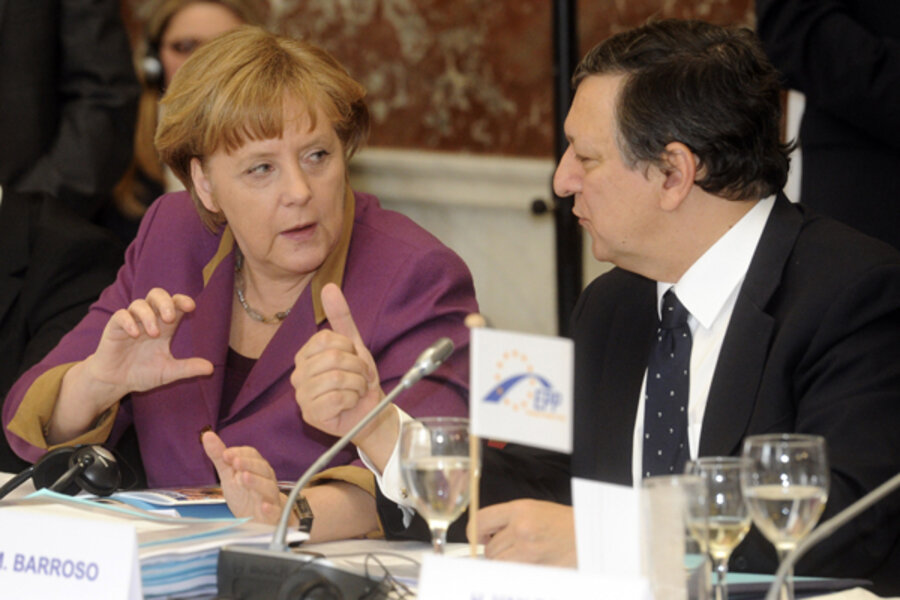EU pushes bigger bailout fund and Germany pushes back
Loading...
| Berlin
Officially, tonight's gathering of the European Union in Brussels is a business-as-usual affair, with questions such as Serbian accession to the EU on the agenda. But behind the scenes, only one issue matters to the European leaders: the size of the new eurozone bailout fund.
Debate over the European Stability Mechanism (ESM) finds Germany pitched against the rest of the EU.
Following a decision at January's EU summit, the launch of the new bailout fund was brought forward by a year. Christine Lagarde, head of the International Monetary Fund (IMF), argued that Europe needed stronger firewalls, which the bailout fund would provide, to protect highly indebted economies against default. The permanent ESM with a volume of €500 billion ($666 billion) is meant to replace a provisional fund in July 2012.
Mrs. Lagarde, the European Commission, the US government, and a majority of EU members states have been pressing for expansion, possibly up to a trillion euros. But Germany, as the main financier of the fund – it pays €22 billion ($29 billion) in cash and guarantees a further €168 billion ($224 billion) – has opposed even talk about an increase.
Martin Schulz, a German Social Democrat who is currently president of the European Parliament in Brussels, has no sympathy for Chancellor Angela Merkel’s resistance. “The bailout fund is not just money,” he says. “It is a psychological tool that demonstrates to the world, to the financial markets in particular, that Europe stands as one. The eurozone is the world’s biggest economy. It can afford solidarity among its members.”
Berlin’s official line has been that a debate on ESM expansion would be premature. Relative calm in the markets allowed officials to wait and see first if the planned debt write-down for Greece would be accepted by investors, Chancellor Merkel’s spokesman said in a statement. But just before the start of the Brussels summit, Germany’s Süddeutsche Zeitung reported that Merkel and her finance minister, Wolfgang Schäuble, were prepared to think about a combination of ESM and the temporary fund, known as the EFSF. The old fund still contains about €250 billion ($334 billion).
An expansion is in the future
Whether Germany caves in at the summit does not really matter, according to Wolfgang Münchau, president of Eurointelligence, a Brussels-based research firm. “The expansion of the ESM fund will come rather sooner than later,” says Mr. Münchau. “The fund is a substitute – and a bad one at that – for the fiscal integration of Europe which would be needed to overcome this crisis, but which the German government does not dare sell to its voters.”
At the summit, European Commission president Manuel Barroso will be pressing for the adoption of an initiative he calls “project bonds” to stimulate economic growth in the eurozone. Under the plan, the private sector would be asked to invest in European infrastructure projects cofinanced by the European Investment Bank.
"There is capital. But private capital needs confidence," Mr. Barroso said earlier this week. "And we believe that there are very good projects in Europe in energy, transport, and in the digital field."
According to the European Commission's annual growth survey for 2012, overall EU growth is expected to be as low as 0.6 percent, with unemployment levels likely to remain at around 10 percent into 2013.
Yesterday, the European Central Bank offered Europe’s banks another injection of cheap cash. Eight hundred firms borrowed €529 billion ($705 billion) for three years at a 1 percent interest rate, the second of the ECB’s so-called long-term refinancing operations this year.







